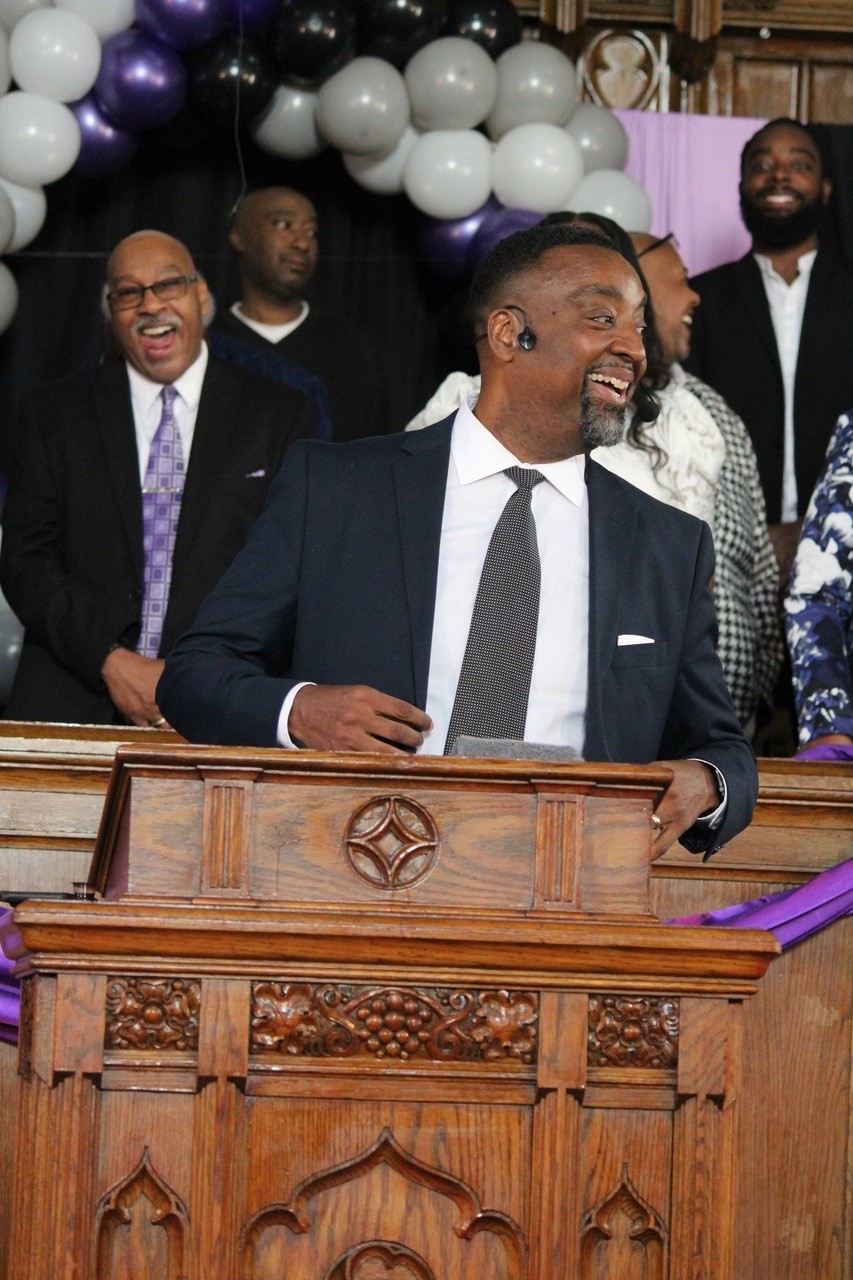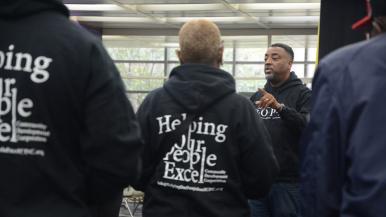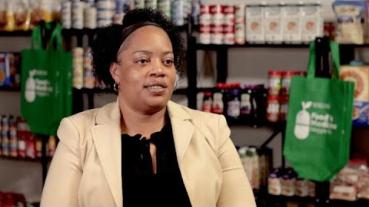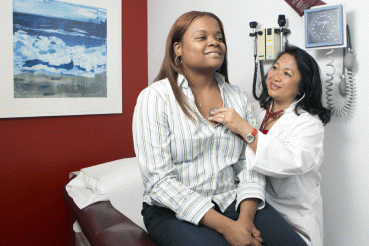For two decades, Pastor Steve Epting has been a pillar of strength and support in Chicago’s Austin neighborhood, where he leads Hope Community Church and serves as a dedicated advocate for the community’s well-being. But when a routine screening revealed serious risks to his health, he realized he needed to make a significant change — for himself and his congregation.
Pastor Epting not only ministers to souls, but he also strives to heal bodies, address health disparities and uplift communities through the Alive Faith Network. This initiative, a partnership between Rush University Medical Center, the global health care company Abbott and more than 100 Chicago-area churches, has sown seeds of hope, healing and empowerment for countless people.
Pastor Epting’s journey with the Alive Faith Network began with a simple yet profound realization: those who give so much to their communities, like himself, often neglect their own well-being.
“When pastors get together and talk about their issues, you really see how we struggle both mentally and physically,” he said. “As pastors, we’re not usually very good at being taken care of because we’re the ones who want to take care of others. It’s almost like being on an airplane — you need to put the oxygen mask on yourself first before you help your congregation.”
This understanding sparked a movement within the Alive Faith Network to focus on health gaps in Black communities by supporting clergy wellness, empowering churches to become centers of health education and resources, and advancing community-focused research.
Helping the helpers
The Alive Faith Network’s first step was taking care of those who support others — offering clergy members like Pastor Epting wellness retreats that provide space to reflect, heal and rejuvenate. Pastors, who are often seen as first responders in their communities, are frequently under immense pressure.
“We’re constantly pulled in different directions, serving congregants, community members and institutions,” Pastor Epting said. “The retreats offered by Alive Faith Network give pastors a rare opportunity to focus on their own mental and physical health.”
Pastor Epting understood firsthand how impactful these wellness events could be when his physical health took a turn.
“I’ve always suffered from certain chronic diseases over my life with the understanding that I had to live better,” he said. “I weighed about 320 pounds, and with the support of the program, I lost 90 pounds over time. So not only do I speak the same language as the pastors, but I’m a beneficiary of what the Alive Faith Network teaches. My experience allows me to speak confidently about the work we do.”
Through this personal transformation, Epting and other clergy members in the Alive Faith Network program can become more effective advocates for health, encouraging their congregations to follow their lead. This community-centric programming is core to Alive Faith Network. With help from Rush, Abbott and its foundation, Abbott Fund, pastors receive the support they need to serve more people through health screenings, education and care provisions.
The church as a health hub: Expanding health ministries
The second pillar of the Alive Faith Network’s work lies in the establishment of health ministries within the church. These ministries act as extensions of the pastor’s role, providing a bridge between the congregation and vital health services, addressing food insecurity, mental health challenges and more.
 This approach is deeply rooted in the understanding that pastors in the Black community hold a unique position of trust. Due to a long history of bias, unethical experimentation and neglect, many in the Black community trust their pastors more than their doctors. The Alive Faith Network’s approach is deeply rooted in the understanding that this unique position of trust positions pastors to inspire life-changing health behaviors.
This approach is deeply rooted in the understanding that pastors in the Black community hold a unique position of trust. Due to a long history of bias, unethical experimentation and neglect, many in the Black community trust their pastors more than their doctors. The Alive Faith Network’s approach is deeply rooted in the understanding that this unique position of trust positions pastors to inspire life-changing health behaviors.
“The church is a hub,” said LaDawne Jenkins, Alive Faith Network co-director. “When people need food, housing or health care, they often turn to the church first. We have a responsibility to help improve the outcomes of the community in which we live. A lot of these things are preventable, and it’s really just a matter of getting to know the people we serve. When you get to know them, you learn what they want. And what they want is to be healthy.”
Through health ministries, the Alive Faith Network empowers churches to become centers of health education and resources. For example, during the COVID-19 pandemic, the strength of these health ministries was on full display. As misinformation and mistrust of vaccines spread through underserved communities, the Alive Faith Network’s health ministries coordinated with Rush to organize vaccination drives and testing clinics at churches throughout Chicago and ensured pastors received the vaccine, playing a critical role in breaking down barriers and saving lives.
Research with purpose: Building trust, breaking barriers
The final element of the Alive Faith Network’s mission is its commitment to health research, which is uniquely designed in partnership with the community. Elizabeth Lynch, PhD, a co-director of the Alive Faith Network and professor of family and preventive medicine at Rush, understands the importance of developing culturally relevant, community-informed health programs.
“Public health programming is often designed by researchers who don’t know much about the community,” she said. “We wanted to change that by partnering with leaders in the Black community to develop programs that truly meet their needs.”
One such program is the Abundant Living study, which addresses high blood pressure — a significant health issue in Chicago’s Black communities. By partnering with churches to conduct screenings and provide education, the Alive Faith Network has been able to identify undiagnosed cases of hypertension and connect people to care, often reaching those who avoid traditional health care settings due to mistrust. This community-based approach, rooted in the churches, not only helps improve individual health outcomes but also addresses systemic inequities in health care access and delivery.
In addition to hypertension, the Alive Faith Network launched initiatives focused on physical mobility and nutrition. The “Keep It Moving” program encourages physical activity among church members, particularly those with limited mobility, while other programs offer diet and lifestyle classes to the broader congregation. The goal is clear: to foster a culture of health within the church that both extends into the community and helps advance research to identify health programs that work best.
“It goes without saying that the Alive Faith Network is creating positive change for all involved,” said David Ansell, MD, MPH, senior vice president for health equity at Rush. “By integrating community insights into our research, we not only empower researchers like Dr. Lynch and the team at the Alive Faith Network to design more effective public health programs, but we also help secure essential funding, like that from the NIH. This collaboration ensures that our research directly addresses the most pressing needs, creating a cycle where communities shape research, and, in turn, research uplifts communities.”
While grants from the National Institutes of Health, or NIH, help support this research, ongoing support from Abbott and Abbott Fund is crucial to the partnership. Since 2020, more than $1 million in Abbott Fund grants, along with donations of Abbott health technologies like COVID-19 tests and nutrition products, have helped advance screenings, community engagement and development of the Alive Faith Network outreach strategy.
“The services and programming we can offer people, like health screenings and designing interventions that specifically appeal to them is huge,” Dr. Lynch said. “The ability to do those things in addition to the research is so important to building trust and achieving health equity.”
Transforming communities, one congregation at a time
By focusing on the health of clergy members, partnering with the community in research and empowering churches to serve as health centers, the Alive Faith Network has created a model of holistic care that is changing lives.
“Abbott and Abbott Fund are proud to provide support and work closely with Chicago institutions Rush University Medical Center and the Alive Faith Network to help bridge health gaps and break down barriers to testing and care,” said Kathryn McKenzie, vice president of Abbott Fund and divisional vice president of global citizenship and sustainability at Abbott. “At Abbott, we are dedicated to providing people with the tools, resources and health education they need to live their healthiest lives.”
The Alive Faith Network is poised to continue its goal of achieving health equity, not just in Chicago but beyond, aligning with Rush’s commitment to ensuring everyone has a chance to live their healthiest lives. The combination of faith, research and community engagement proves to be a powerful force for good.
“Our team cares about the work and the people being served,” Pastor Epting said. “We want to change our communities, health statistics and health outcomes. That takes not only communication and education but also love, determination and accessibility. We’re always present, meeting people where they are. That’s how trust is built and lives are changed.”




